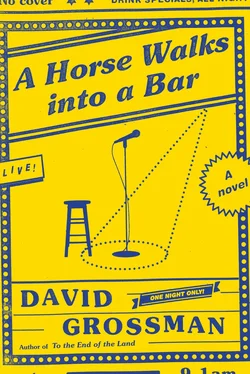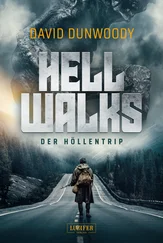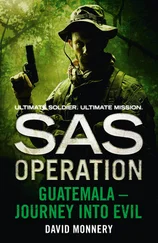After the second night, I begged my teacher to let me switch. On the third night I lay in a different bed, in a different tent, far from his, but I still felt the aftershocks. On the fourth night they assigned me to guard duty with a girl in my class, and I stopped thinking about Dovaleh.
He was right: I blocked him out.
—
“At night everyone runs in the dark between the tents, and from every direction you hear aahh and oooh and Get your hand out, you idiot, and C’mon, let me. And Gross, what’s with the tongue? And Put your hand there, just feel it, and I really really can’t today, and My mom will kill me, and How the hell do you open all these hooks, and What is that, yuck, what did you squirt on me, and You bitch, you shut my zipper on it …”
His audience surges and ebbs on waves of laughter. He still avoids my look. I wait. I’m ready. In a minute or two he’ll turn to me with a big grin: What a coincidence! Such a small world! The Honorable Avishai Lazar was there, too!
—
On the second morning I was sent from the firing range to bring the water canteen I’d left in my tent. I remember how nice it was to be alone suddenly, away from the noise and the yelling and the commands that filled up every inch of space, and what a relief it was to finally be without him, without the torture of his presence. The air was clear and there was a soothing freshness everywhere. (Now, as I write, the smell of the water and soap from the morning wash comes back to me, pooled in the little cement dimples of the tent floor.)
I sat on my bed. The tent flaps were open and I could quietly look out at the desert, whose beauty stunned me and was something of a comfort to me. I tried to empty my mind. And it was then, perhaps because I let down my guard for a minute, that I started to feel, deep in my throat, a kind of crying I had never tasted before. It was a cry of grief, of terrible loss, and I knew it was about to rattle me uncontrollably.
Suddenly Dovaleh walked in. He saw me and froze. He took a few uncertain, almost faltering steps to his bed and dug through his backpack. I fell on my bag and rummaged in it and buried my face in it. The big sob dried up at once. After a minute or two, when I didn’t hear anything, I thought he’d left and I looked up. He was standing next to his bed with his face to me and his arms at his sides. We exchanged dark, blunted looks. His lips moved; perhaps he wanted to say something. Or perhaps he was trying to smile, so I would remember him, remember us. I must have responded with a sign of warning, or aversion, or disgust. His face twisted and trembled.
And that was all. When I looked up again, it was to see him walking away from the tent.
—
“And then, on the third day,” he shouts, “or maybe the fourth, who can remember? Who the hell can remember anything at all? My memory, of blessed memory…Anyway, we’re sitting on the ground in a circle and the sun’s beating down on us like a bitch. If there’s any shade at all, it’s only from the vultures waiting for us to drop dead already. The cross-eyed counselor is talking about camouflage or something, when suddenly a woman soldier runs out of the base commander’s barracks, she was a sergeant I think, and she gallops over to us, boom-boom-boom, a petite woman but with considerable heft, if you know what I mean, busting out of her uniform, legs like a doe, each one a whole doe—heh-heh—and a second later she’s at our circle, the drill cadet doesn’t even have time to say ‘Attention!’ and she barks, all out of breath: ‘Greenstein, Dov! Is he in this platoon?’ ”
—
I remember the scene. Not the soldier herself, but the way she sharply called out his name, which shocked me out of my daydream. His name sailed over me so unexpectedly that I almost jumped up in a panic and said it was me.
—
“Right then and there I could feel something rotten coming on. And all the kids in my class, my close friends, they all point at me and yell: ‘It’s him!’ Like they’re telling her: ‘That one! Take him, not me!’ With friends like that…right?” He laughs and avoids looking at me. “They wouldn’t have been much fun at a selektzia, you know? So the soldier girl says: ‘Come with me to the commander immediately.’ And this castrated voice comes out of my mouth: ‘But ma’am, Sergeant, what did I do?’ My friends think that’s hilarious: ‘But ma’am, Sergeant, what did I do?’ they all mimic me. Then they start shouting: ‘Are you gonna reprimand him for jacking off? Or for stinking up the tent?’ They rat me out with all kinds of lies, then they chant: ‘Throw Eraser in the slammer! Throw Eraser in the slammer!’ Yep, Eraser was another one of my nicknames. Why? I’m glad you asked! Because back then I had freckles, I don’t have them anymore, they faded, but I had loads of them—yes, that is correct, someone shat on the fan, thank you so much for the original explanation, table nineteen.”
He turns his head slowly in the direction of the heckler, his regular gimmick, and glares at him with blank eyes. The club manager aims a spotlight on a thick-fleshed man with a shaved head wearing a yellow jacket. Dovaleh does not remove his gaze. His eyes are open just a slit. The audience bellows.
“Well, good evening, Mr. Tony Soprano decked out in lemon meringue!” he says sweetly. “Welcome to our humble abode, and may you have a very crystal Nacht. I understand you’re in between medications at the moment, and just my luck, you had to choose this particular evening to get out for some fresh air!” The man’s wife laughs and pats his back, and he blows air loudly and shakes off her comforting hand. “It’s okay, brother, it’s all good, we’re just having fun with you. Yoav, give the gentleman a shot of vodka, on me, and don’t forget to slip in a couple of Xanax and some Ritalin…No, no, you’re all right, my man, at the end of the evening you’ll be awarded the Al-Qaeda Prize for emotional intelligence. I’m not laughing at you, brother, I’m laughing with you, okay? Just imagine that I’ve heard that joke about the fan a couple of thousand times before. We had one kid in class, you and him would have gotten on like a house on fire, he was just like you—spitting image.” He puts his hand around his mouth and whispers to us: “All the subtlety of a wrecking ball and the grace of a jockstrap—I’m kidding, sit down! It’s a joke! And every time that kid saw me, but every single time, for eight fucking years, he would ask if I wanted an eraser for the freckles. So that’s how the name Eraser stuck, see? There don’t happen to be any of my old classmates here tonight, do there? No? So I can keep on lying unchecked? Wonderful! Anyhoo, I get up and shake the sand off my ass—by the way, that was how the original Desert Storm started—and I walk away from my posse and follow her, and I know this is it, I’m done for. Right that second I had the feeling I wouldn’t be going back anymore. That this whole thing was over for me. My childhood, I mean.”
He takes a sip from the flask. The club echoes with that indistinct but irritable pulsing. People are still waiting to see how the evening is going to develop, but his credit is running out. I sense their response in my body like rapidly dropping blood sugar. I remember: a moment before he answered the soldier and stood up, he sought me out and gave me a long, pleading look. I avoided his eyes.
“Talking about childhood,” he murmurs, “I was thinking, you know how everyone’s all up in arms about bullying these days? Well, I say, some kids just deserve to get bullied. Because if they don’t get the crap bullied out of them when they’re young, it’ll just get worse the older they get, you know what I mean?
Читать дальше












